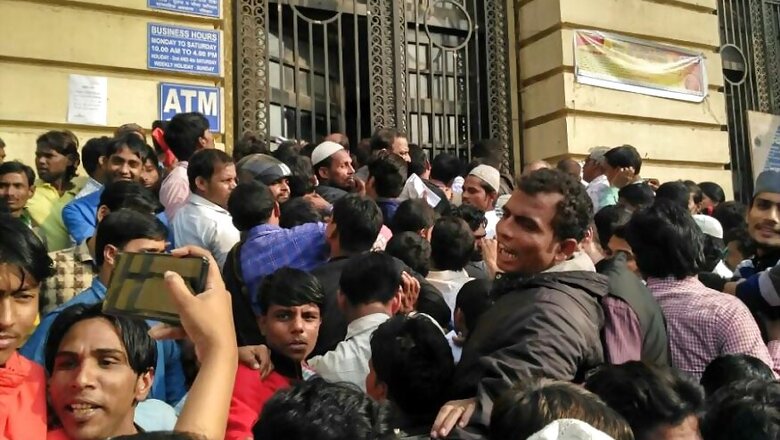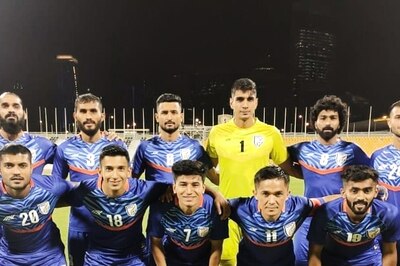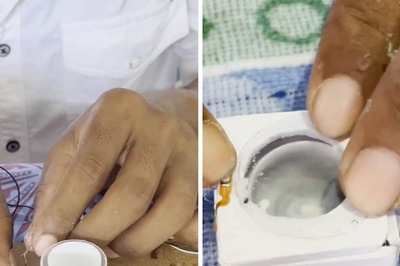
views
Bengaluru: If that last scene in the Rajnikanth blockbuster 'Sivaji' is anything to go by, then you would think that every medical college in the country has tonnes of cash falling out of its roof-top.
Reality may not be so different, when you consider that in the last five months three medical colleges have been raided by Income Tax sleuths in Karnataka and Tamil Nadu – and these have yielded 'concealed money' of over Rs 700 crore.
No wonder then that taxmen have started asking information from registered Trusts -- whether educational or charitable -- in the wake of the demonetization drive. The top 100 tax-paying Trusts are being issued notices on what their cash-in-hand status was, as on November 8, the day Rs 500 and Rs 1,000 notes ceased to be legal tender.
This vigil is being taken up to track cash exchanges being made through these Trusts – a large number of them being educational Trusts which run medical, engineering and other professional colleges.
"We found over Rs 40 crore cash in one college in Bengaluru which was unaccounted for – this was in end-September, before the currency ban. Besides, our teams in Tamil Nadu raided two colleges in the state four months back, where one management itself admitted to over Rs 450 crore it had concealed. Of course we found more than that. What they admit to, is always lesser than what we find," says a senior IT official.
Considering that a large number of medical colleges have charged capitation fees over the past decade and more, tax men are extra vigilant over how much black money actually comes out of the different vaults or roof-tops they may be hidden in.
This year is relatively better because of NEET – the centralised National Eligibility cum Entrance Test – that has been made compulsory for all students before they can seek admissions to such professional courses.
"Now that NEET is there, you can't just have a student buying his MBBS seat. You still have to have some merit, get a rank. Of course, some colleges have found a way around this, in that even low-ranking students have got seats. But the menace of non-merit students buying their seats has been reined in," says principal of a government college in Bengaluru on condition of anonymity, who has keenly studied (and been shocked by) admission processes.
The 'going rate' for an MBBS seat in a private college, for instance, has gone up to Rs 1 crore in the last two-three years. The cost of an MD seat is Rs 5 crore or more. On paper, students paid about Rs 15-20 lakh. The rest was cash, with no receipts, the principal says.
If colleges have been sitting on this kind of cash-stash for, let's say, five or ten years, they could be staring at a huge amount of valueless bits of paper unless they find an innovative way to 'whiten' it.
But what will be more interesting to watch will be its impact on politics, elections in particular, he says.
"The education lobby and the realty lobby have been controlling the election funding. To a smaller extent, maybe industrialists contribute to politicians but even they don't have so much liquid cash. The big money – hundreds of crores -- has come from education and real estate lobbies. That's why politicians run most of these colleges and education trusts," the principal points out.
A majority of the 32 private medical colleges in Karnataka are run by politicians – some of whom are ministers in the current State government.
One of the colleges raided in Tamil Nadu, in fact, was run by a former Union Minister, DMK politician Jagatharakshakan.
Colleges of course could now distribute money stored in one place among their employees or others, a retired bureaucrat predicts.
"But they are bound to be worried about how much of it will come back. If you give it to your employee, he may be worried about his job so he may give it back to you after putting it in a bank. But if you give it to someone else, he may just blow the money in drinking or say he paid off old loans, and postpone it indefinitely," says the bureaucrat, who is currently affiliated with one Trust.
Dr Ushy Mohan Das, founding-president of Doctors Against Corruption and former inspector of colleges at the Medical and Dental Councils of India, says colleges are already finding ways around the currency ban.
"One college had not paid about twenty employees for the last three months. Suddenly, they pay three months' salaries at one-go. The staff is told – do what you want. If they have NRI students, they would have already taken the capitation fees in dollars. Or ask the parents to do so now," she says. There are even some colleges whose staff have been paid salaries partly in 'black' and partly in 'white' for years.
Dr Das also feels collection of capitation fees could come back with a vengeance in the next admission season.
"Everyone is feeling the pinch. Colleges may be facing losses, but so is the IT officer and the Medical Council member whose black money is valueless now. You have to make up for these losses. How will you do it, unless you admit students under NEET, then charge them fee A, fee B, fee C under different heads after admission?" Dr Das says.
While not everyone may have money to cough up capitation fees immediately, we would only know how the 'business' is affected by the next admission season – which is supposed to end by September 2017 but starts as early as March.
Gradually, the black money could get generated, admits the bureaucrat.
"For instance, a corrupt contractor could still submit fake bills for some civil works, get money, pay bribes to government officials, and start the same old cycle. And of course, he will have Rs 2000 notes to pay with, which is easier. But that will take its time. Even if a college wants to charge huge amounts within the framework of NEET criteria, it may not find someone who can pay by next September. But gradually, black money will get generated," he says.
Unless demonetisation is quickly followed up with a stronger Lokayukta, better checks and balances, and reducing cash rotation to a large extent, black money could in fact come back with a vengeance in pink – especially considering that the next two years have some crucial State assembly elections and current 'stores' could get drained out by December-end.
Ninety per cent of private medical colleges are run by politicians or their kin, says Dr Das, adding that some of the deemed universities she has inspected previously were shams in the name of education.
"There are universities where the chancellor, the pro-chancellor and the vice-chancellor are husband, wife and son. Is that possible to have such 'academics' in the family – they are just family-run business that are churning out quacks," she says.


















Comments
0 comment